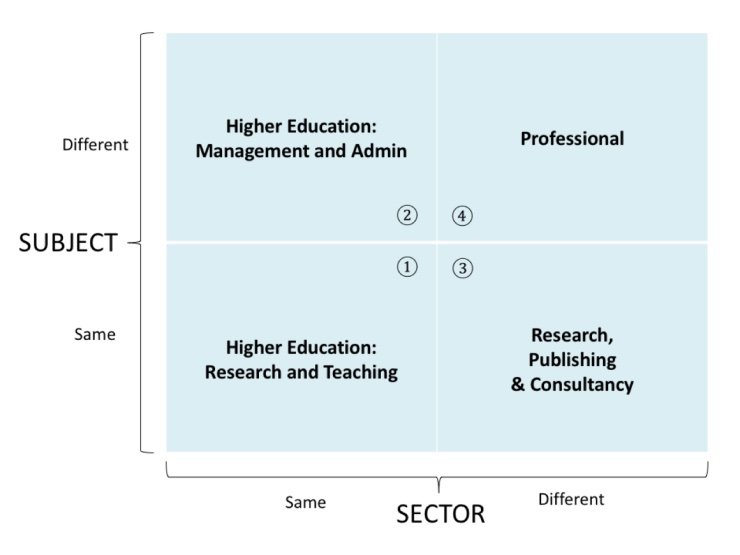Your job options after a PhD – in a diagram
What are your job options after you complete your PhD? I don’t just mean within academia, but much more broadly – since doctoral researchers are capable of doing so many things after a PhD. I drew this diagram to help illustrate the range of career options open to researchers:
The diagram shows that after completing your PhD, you have the option to apply for jobs in either the SAME or DIFFERENT employment sectors (SAME=Academia, DIFFERENT=Health Service, I.T., Financial Services, Government etc.).
You also have the option to apply for jobs where you’ll continue to use your academic subject knowledge, in which case your ‘subject’ stays the SAME too. Basically, these are traditional academic jobs. Or you can get a job using the range of transferable skills you’ve gained during your PhD, in which case your subject would now be DIFFERENT: you’d be working primarily in an applied area like administration, project management, marketing or computer programming, and not in an academic subject area like the humanities or chemistry (for simplicity I’m assuming that your PhD is not in one of the applied areas listed).
So the resulting 2×2 matrix shows that a doctoral researcher has 4 main employment options (leaving aside self-employment), which are shown as numbers on the diagram:
Higher Education – Research and Teaching: You can continue your career within the Higher Education sector, applying for posts as a lecturer or professor, or to carry out research in the area of subject knowledge that you’ve studied and been trained in.
Higher Education – Management and Administration: You can continue to work within the Higher Education sector, but you can start to specialise in a subject area or body of knowledge that differs from your core academic discipline. For instance you can apply for posts in university administration, careers advice or fundraising. If you were to manage a research centre in your area of academic subject expertise, this would put you on the borderline between 1 and 2.
Research, Publishing and Consultancy: You can continue to work within the same area of subject knowledge as your PhD, but do so in a job outside of Higher Education, applying for posts such as a researcher working in a lab for a private company, or in a government department.
Professional: You can apply for posts in another sector where you won’t be using the specific academic subject knowledge that you gained from your PhD discipline either. For example, I now work as a project manager for a sustainable bank. I don’t manage projects relating to History or Literature (my academic training) – but I do manage technology projects and I help the bank to launch new financial products and services.
This post was updated to include a revised diagram in October 2019.

